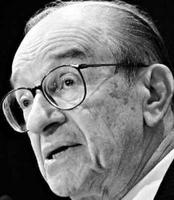 When Federal Reserve Chairman Benjamin Strong died in 1928, the market juggling with which the Fed was struggling fell in a heap, and the world caught a case of economic pneumonia. Incumbent Fed Chairman Alan Greenspan, nearing retirement and speaking at the Kansas City Fed's annual symposium, shows he is both keenly aware of his legacy and his place in history, and concerned too at the prospect of the economy catching a cold with his departure on January 31st.
When Federal Reserve Chairman Benjamin Strong died in 1928, the market juggling with which the Fed was struggling fell in a heap, and the world caught a case of economic pneumonia. Incumbent Fed Chairman Alan Greenspan, nearing retirement and speaking at the Kansas City Fed's annual symposium, shows he is both keenly aware of his legacy and his place in history, and concerned too at the prospect of the economy catching a cold with his departure on January 31st.Bloomberg's Caroline Baum says Greenspan's was a speech of two halves, in which both his heroes Adam Smith and Ayn Rand featured :
[First] Greenspan provided a brief history of the changing attitudes toward the government's role in the economy: the free- market capitalism of Adam Smith that prevailed in the 19th and early 20th centuries; the attempt at interventionist, demand-side management advocated by John Maynard Keynes during the 1930s Depression...; the resultant stifling of competition and economic stagnation of the 1970s; the failure of wage and price controls and eventual disillusion with regulation; and the ultimate triumph of free markets when "the collapse of the Berlin Wall in 1989 exposed the economic ruin behind the Iron Curtain," Greenspan said.
It was Atlas Shrugged without Dagny Taggart and Hank Rearden to lead us through the struggle. Greenspan was present at the creation of Ayn Rand's masterpiece as part of the free-market philosopher's inner circle in the 1950s. It makes perfect sense that as he gets ready to retire from the Fed on Jan. 31, Greenspan would create an idealized image of himself, even if it differs from reality. But that's not quite an accurate portrait of the speech. Rather than talking up his role, Greenspan then declared his unshakeble belief in Adam Smith's invisible hand and the power of market forces, and his view that despite the liberalisation of the world's economies there is perhaps still too much dependence on uber-gurus like himself:
Governments today, although still far more activist than in the nineteenth and early twentieth centuries, are rediscovering the benefits of competition and the resilience to economic shocks that it fosters. We are also beginning to recognize an international version of Smith's invisible hand in the globalization of economic forces.
Whether by intention or by happenstance, many, if not most, governments in recent decades have been relying more and more on the forces of the marketplace and reducing their intervention in market outcomes. We appear to be revisiting Adam Smith's notion that the more flexible an economy, the greater its ability to self-correct after inevitable, often unanticipated disturbances. That greater tendency toward self-correction has made the cyclical stability of the economy less dependent on the actions of macroeconomic policymakers, whose responses often have come too late or have been misguided.He then suggested, counter-intuitively to some, that the Fed's economic management itself somewhat discourages the necessary strength and agility that allows these self-corrections to happen. To the extent the Fed's management is successful, he sggested, it necessarily alters investors' perception of economic risk, and it also makes the Fed the focus when asset bubbles happen, rather than the focus being on the misalignments themselves.
Relying on policymakers to perceive when speculative asset bubbles have developed and then to implement timely policies to address successfully these misalignments in asset prices is simply not realistic.Is he perhaps suggesting that the time has come to diminish the role of the Fed? Or is he just trying to allow his successor -- whoever that may be -- to settle into the job without the same glare of attention the incumbent enjoys. What's your call?
An earlier version of Greenspan's speech is online here.
Categories: US_Politics, Objectivism, Economics
2 comments:
Greenspan has effectively incorporated many Austrian economic principles into the mainstream - and had the lightest hand ever on the Fed.
As to the Fed getting the blame from investors when bubbles burst - that it what happens if you set yourself up as the All Knowing One on something.
that is what happens if you set yourself up as the All Knowing One on something.
Nudge nudge, wink wink.
Post a Comment